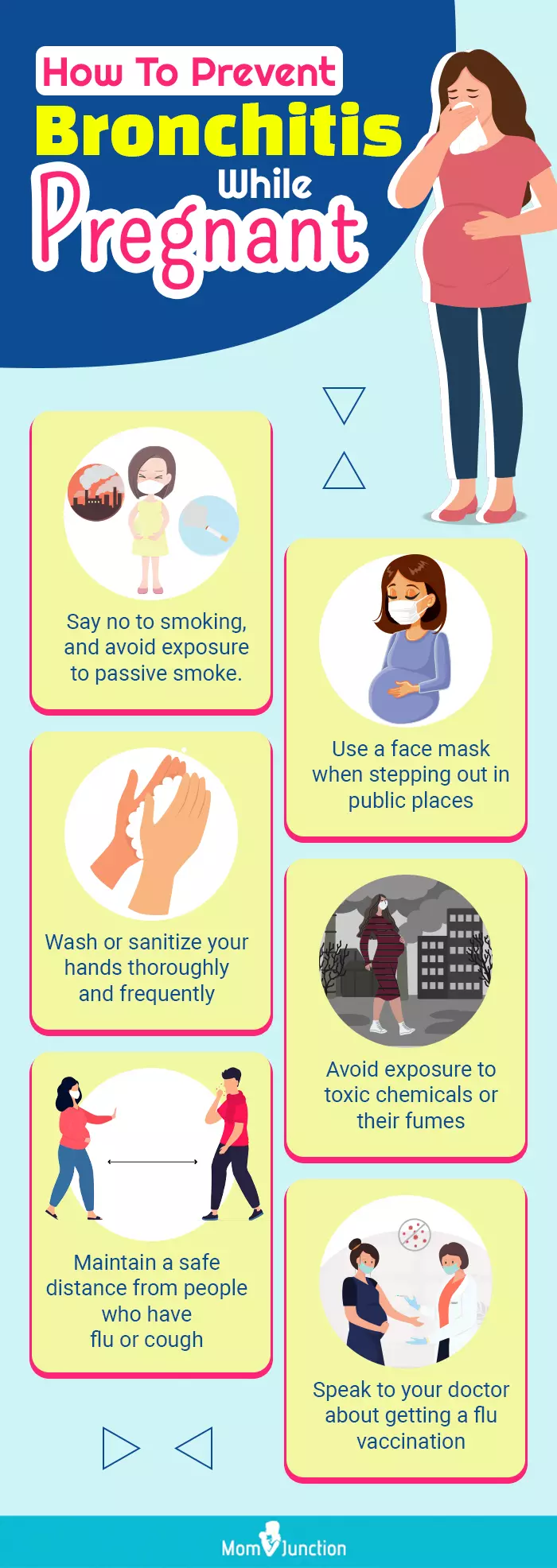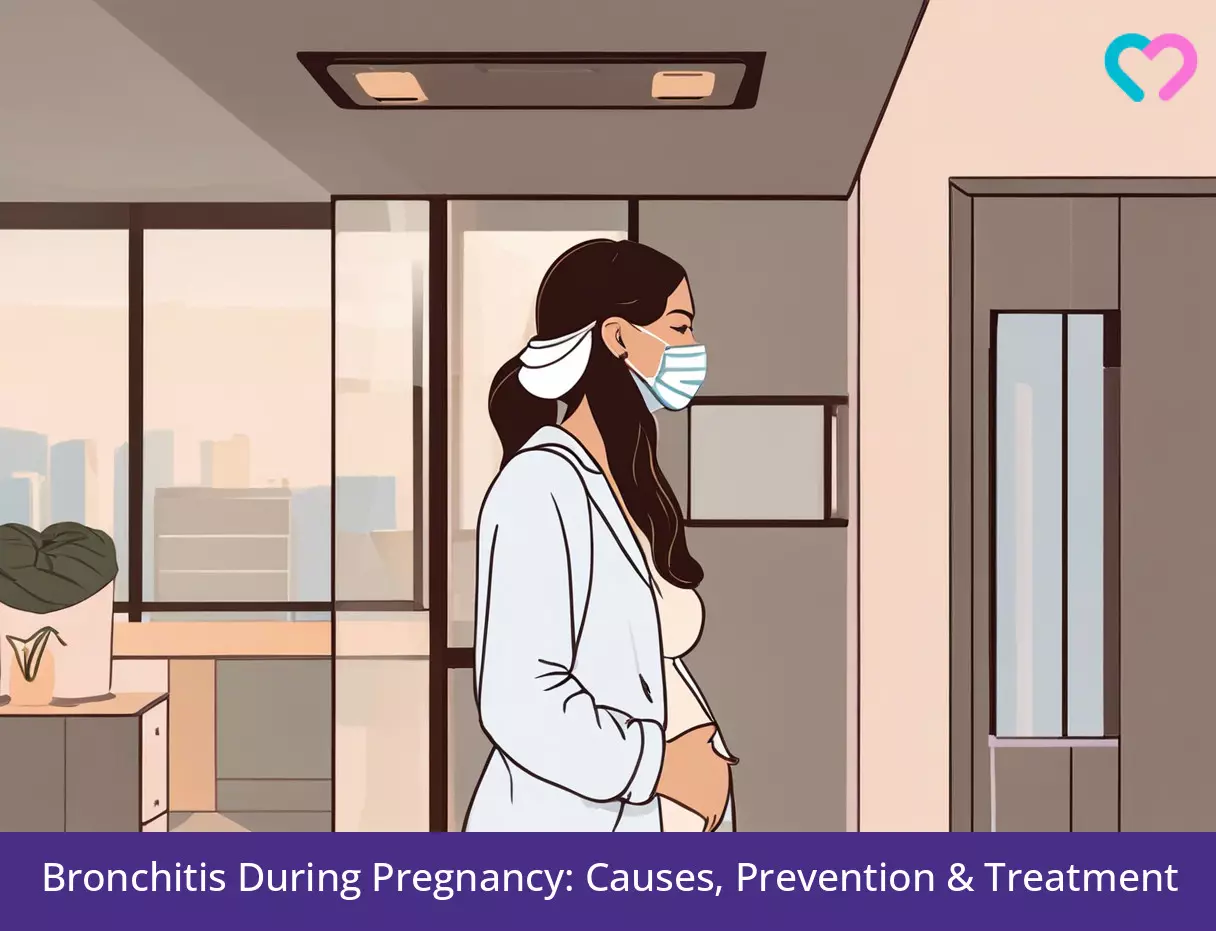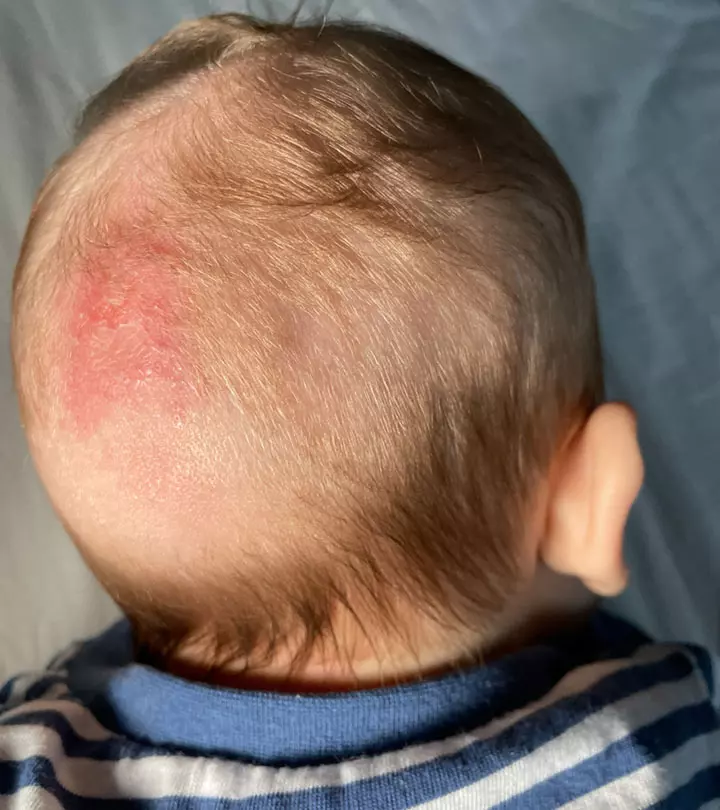
Image: iStock
Inflammation in the bronchial tubes or bronchitis during pregnancy can cause excessive coughing and spasms in the airways affecting lung health.
Although it is not considered harmful to the growing fetus, it may cause discomfort to a pregnant woman. However, it is still advisable to consult a doctor if you are affected with bronchitis while pregnant to ensure your baby’s safety.
Continue reading this post to learn about the possible causes of bronchitis during pregnancy, its symptoms, diagnosis, and treatment. We also suggest some home remedies effective in relieving the symptoms and preventive measures against bronchitis.
Key Pointers
- Bacterial or viral infections and exposure to irritants can cause inflammation in the bronchial tubes, known as bronchitis.
- Acute and chronic bronchitis causes excess mucus secretion, breathing difficulties, cough, mild fever with chills, fatigue, poor appetite, body ache, and drowsiness.
- Severe bronchitis symptoms during pregnancy may require a medical diagnosis to avoid fetal growth complications.
- Treatment for bronchitis during pregnancy typically involves rest and over-the-counter or prescription medications as recommended by a doctor.
- To prevent bronchitis, avoid smoking and inhaling irritants, sanitize regularly, get vaccinated, avoid contact with people who have bronchitis, and consult a doctor for proper diagnosis upon the onset of primary symptoms.
What Is Bronchitis?
Bronchitis is an inflammation of the two largest airways that pass air from the windpipe (trachea) to the lungs.
It can be due to infections or irritants. The airway irritation and inflammation could lead to difficulties in breathing and excess mucus secretion. You may develop a severe cough, which is the body’s mechanism to clear the extra mucus from the airways.
There are usually two forms of bronchitis – acute and chronic – with different symptoms and characteristics. Bacteria or viruses cause acute bronchitis, also called the chest cold. It is common during the winter months and usually comes after a common cold, flu, or sore throat and lasts up to three weeks. Though it is not harmful and does not pass any microbes from the mother to the fetus, you may require treatments to relieve symptoms and prevent complications.
Chronic bronchitis lasts for a longer duration. It is usually caused by cigarette smoke or other irritants. It can be recurrent and causes complications due to lung damage. You may require medications to remove the mucus. Chronic bronchitis can be complicated if there is an infection with bacteria or viruses. The infection could result in yellow or dark green mucus, fever, and shortness of breath (1).
Causes Of Bronchitis During Pregnancy
1. Virus and Bacteria
Approximately 90% of bronchitis is caused by viruses such as influenza A and B, coronaviruses, parainfluenza virusesiCauses upper and lower respiratory infections in children and adults, such as colds, pneumonia, and bronchitis. , and rhinoviruses, which also cause the common cold and flu (2). The mucus buildup, as a result of cold or flu, can also lead to bronchitis.
Though it is not common, bacteria can also cause bronchitis. It can be an initial infection or superinfection that occurs over an already existing viral infection. It can be caused by bacteria such as Mycoplasma pneumoniae, Streptococcus pneumoniae, Haemophilus influenzae, Moraxella catarrhalis, and Bordetella pertussis (3).
Acute bronchitis caused by viruses and bacteria is contagious, and the infected person can pass it around to others while sneezing or coughing. Viral bronchitis can be contagious for a few days or up to a week. Bacterial bronchitis may not be contagious 24 hours after starting antibiotics. However, chronic bronchitis due to irritation of airways is not infectious (4).
2. Breathing irritants

Cigarette smoke, tobacco smoke, smog, chemicals, chemical fumes, and dust particles can all lead to bronchitis. Breathing in fumes and smoking during pregnancy can aggravate the existing inflammation and may result in chronic bronchitis. It may also cause respiratory illness in children through a congenital effect (5).
3. Prolonged exposure
Continuous exposure to inhalants, such as grain dust, strong acids, ammonia, chlorine, etc., can cause bronchitis (6).
Gastroesophageal reflux disease (GERD), asthma and allergies, and positive family history can also increase the risk of bronchiti (4). Based on a collaborative study by Zagazig University Faculty of Medicine and Steward Medical, the prevalence of bronchial asthma in pregnancy is between 8.4% and 8.8% in the United States
Bronchitis Symptoms During Pregnancy

The initial symptoms of bronchitis include (7) (8):
- Cough (most common, dry or productive)
- Sputum production (clear, yellow, green or blood-tinged)
- Shortness of breath
- Runny or stuffy nose
- Sore throat
- Slight fever and chills
- Drowsiness, weakness, irritability, and fatigue
- Loss of appetite
- Chest pain and body aches
Cough is the predominant symptom of acute bronchitis, and it can be with or without mucus production. Usually, you may have a dry cough during pregnancy at the beginning of bronchitis and later experience a productive cough. People with bronchitis can have a persistent cough to clear the mucus. These symptoms can be treated at home.
Usually, acute bronchitis may last for 10 –14 days or up to three weeks (4). Often, the cough may persist up to 10-20 days after the course of the disease. Rarely, it may last up to four weeks or more (9). In addition to the above symptoms, pregnant women may also feel tired and emotionally overwhelmed as a result of the illness.
Risks Of Bronchitis During Pregnancy
Serious complications are unlikely to develop in most women. The major risks include:
- Breathing difficulty and hypoxiaiA condition when oxygen levels in the body tissues decrease below normal, causing confusion, anxiety, shortness of breath, and headache. : Bronchitis causes difficulties in the movement of air in and out of the airways due to the inflammation of the bronchial walls. Along with this, you may experience breathing difficulty during pregnancy from the distended pregnant belly. This may deprive your body of oxygen, making you breathe less than the optimal levels and reducing the necessary oxygen to the fetus.
- Pneumonia: If left untreated, bronchitis may sometimes lead to viral or bacterial pneumonia. Suffering from pneumonia in pregnancy may result in fetal complications such as low birth weight and increased risk of preterm birth. It may also lead to maternal respiratory failure (10). High fever is a common symptom of pneumonia. During the first trimester, this may cause birth defects, especially among the women who did not consume 400mcg of folic acid every day (11). It is observed that pneumonia during pregnancy may lead to higher maternal mortality rates compared to non-pregnant women. Also, chronic diseases, such as pneumonia, are associated with an increased likelihood of incident cardiac complications and congestive heart failure in individuals with the condition.
- Appetite loss: Bronchitis can also affect your appetite levels. When you eat less, your baby will not get enough nutrients, which can hamper the overall fetal development (9).
To lower this risk, it’s important to eat a balanced diet, get enough rest, and follow a healthcare provider’s recommendations for staying healthy. Sometimes, you may have difficulty differentiating the signs and symptoms of bronchitis from complications such as pneumonia. It is recommended to seek prenatal care if you have symptoms of bronchitis during pregnancy. Your doctor will recommend home treatments or medications based on your clinical status.
Home Treatments For Bronchitis
If the symptoms are mild, you can follow some home remedies after discussing it with your healthcare provider. The following home remedies may help in reducing the symptoms of bronchitis.
- Consume plenty of fluids (12), especially warm drinks. Some good options that you may try are:
- Tea with honey, raspberries, and lemon. A few studies have shown that consuming honey while pregnant may help to decrease the severity of cough (2).
- Consuming a moderate amount of turmeric every day could help you prevent respiratory infections (13).
- Decoctions made of herbs like sage, thyme, oregano, and coltsfoot may help to relieve symptoms of bronchitis.
- Take plenty of rest to support your immune system as it helps to destroy the virus (12).
- Garlic and raw onions may also help to relieve symptoms. You could swallow chopped garlic or onion mixed with raw honey, twice a day to relieve the symptoms (14).

- Ginger can help in reducing respiratory infections. You may add dry or fresh ginger to your daily diet. But it is not advised to be taken as a medication or supplement during pregnancy (15).
- Humidifiers or steam inhalations manage your breathing difficulty. It can loosen the mucus and ease the cough. You can also breathe steam from the shower or a bowl of hot water (12).
- Peppermint is often used to treat the symptoms associated with colds and coughs. Menthol, its active ingredient, is believed to be an effective decongestant (16). When absorbed through a diffuser, the mild scent of peppermint oil can help make breathing easier. To use it as a steam inhaler, boil some water and add seven to eight drops of peppermint oil. Then, cover your head with a towel and take deep breaths over the hot water. However, limited evidence demonstrates the safety of peppermint oil during pregnancy. Therefore, it is advisable to consult your doctor for appropriate guidance on its safe use.
- Nasal irrigation may help. You could make the saline solution using warm water (8oz), salt (half teaspoon), and baking soda (half teaspoon). Lean over a sink with your head at a 45-degree angle and nostrils facing the sink.
Pour the solution into one nostril while breathing through the mouth. The fluid flows through the nasal cavity and comes out through the other nostril. It, therefore, rinses off the mucus and helps you feel less stuffy. Repeat the same three to four times every day (17).
Some of the over-the-counter medications may also help you relieve symptoms. However, it is recommended to seek medical advice to make sure that it is safe for you and your baby.
When To Meet The Doctor?
You may require immediate medical attention if you are experiencing the following symptoms (12):
- Temperature higher than 100.4 °F or 38°C
- Coughing up of blood or blood-tinged sputumiA thick mucus produced in the lungs that safeguards its delicate tissues and keeps the respiratory tract moist.
- A persistent cough accompanied by chest pain
- Repeated bronchitis or severe symptoms
Bronchitis usually does not cause serious pregnancy complications or birth defects to the fetus. But the above-listed symptoms could be a complication of bronchitis, such as pneumonia, which makes early diagnosis and treatment essential to avoid unfavorable outcomes. If your symptoms don’t improve with home care or you have a history of respiratory problems, contact your healthcare provider right away.
Diagnosis Of Bronchitis
The diagnosis of acute bronchitis is usually obtained from a history of symptoms, and careful physical examination of the pregnant woman. The following examinations and tests could be done for the diagnosis of bronchitis (2):
- Your doctor may examine the larynx to notice the reddish hue, ribs, and swelling, which occurs during inhalation and exhalation. Examination of tonsils and palpation of lymph nodes are also done.
- Auscultation (listening to breathing with a stethoscope) may help to identify changes in breathing and additional breathing sounds such as wheezes.
- Your doctor may also assess vital signs, such as temperature, respiratory rate, heart rate, and blood pressure.
- Laboratory tests may give a more accurate diagnosis. A blood analysis helps in determining the markers of inflammation such as C-reactive protein (CRP) and erythrocyte sedimentationiA test that shows pain and swelling in the body by measuring the time taken by the red blood cells to separate from a blood sample. levels (ESR). Blood cell count also helps to differentiate bacterial and viral infections.
- A blood test can be carried out to monitor the amount of carbon dioxide and oxygen in the blood (18).

- The culture of sputum or nasal discharge could help identify the causative organism (18).
- Pulmonary function tests such as spirometry may be used in some cases. This will help monitor the lungs’ function of circulating the air (18).
Your doctor may recommend a chest X-ray if there are signs of pneumonia, such as dyspnea, blood in sputum, high fever, and increased respiratory rate. However, they are mostly avoided to prevent the radiation risks to the fetus.
Your doctor may order a few additional tests to differentiate other respiratory diseases such as pneumonia, tuberculosis, and whooping cough, which could have similar symptoms.
Treating Bronchitis During Pregnancy
Your doctor will give medications that are safe during pregnancy, according to your trimester and clinical diagnosis. Treatment of acute bronchitis is mainly supportive care and symptom management. If you have bronchitis due to bacterial infection, your doctor will prescribe antibiotics after weighing the potential risks and benefits of the medications to maternal health and fetal development.
Bronchitis caused by a virus may resolve itself in a few days. You may require some home treatments to relieve the symptoms, as advised by your doctor. But if the symptoms are severe and continue to remain for a longer duration, you may require medications. Antiviral medications may be given for viral illness while pregnant, which may reduce the duration, severity, and complications of the illness.
Your doctor may include cough syrup, decongestants, cough suppressants, and other medications to relieve symptoms. If you have severe difficulty in breathing, you may receive bronchodilatorsiMedications that relax the muscles in the lungs and widen the airways, alleviating lung issues. .
Chronic bronchitis is managed on a long term basis, and you should visit the doctor if you are experiencing increased symptoms (2).
Preventive Measures For Bronchitis During Pregnancy

Though it is not always possible to avoid contracting bronchitis, some measures help to minimize its occurrence (12).
- Quit smoking and avoid exposure to second-hand smoke.
- Keep away from people who have bronchitis. If you notice anyone around you is affected by cold or flu, use a face mask.
- Rinse your hands frequently and use an alcohol-based sanitizer. It reduces the risk of contracting a viral infection.
- Limit exposure to all irritants like chemical fumes and household cleaners, as they aggravate the lining of the bronchi and put you at risk of viral infection.
- Get the recommended flu vaccines on time (19).
- Maintain a clean living environment by regularly dusting and vacuuming to reduce allergens and irritants in the air.
 Quick tip
Quick tipAre Steroids Safe For Bronchitis During Pregnancy?
In severe cases of bronchitis, your doctor may prescribe steroid drugs. Though they are believed to be strong for pregnant women, they are commonly used by doctors to treat various pre-existing medical conditions.
Frequently Asked Questions
1. Can bronchitis turn into pneumonia?
It is possible to get an infection that causes both bronchitis and pneumonia, but bronchitis does not usually lead to pneumonia (21).
2. Is Vicks VapoRub good for bronchitis?
Menthol vaporubs such as Vicks VapoRub may help calm cough and ease congestion. Hence they may provide some symptomatic relief for bronchitis (21).
3. How do I sleep with bronchitis?
Cough in pregnancy seems to worsen when you lie flat. Use a wedge pillow or multiple bed pillows to prop your head and neck. Lying in a position that keeps your head elevated above the rest of your body may help reduce the severity of cough (22).
Bronchitis during pregnancy might cause discomfort in the airways and also lead to severe coughing. They can be caused either due to exposure to the causative agents or breathing irritants. Thus, it is advised to limit your exposure to irritants, clean and sanitize your surroundings from time to time, and get the recommended vaccines at the right time to avoid complications in your pregnancy. Also, consume plenty of fluids and inhale steam to relieve the symptoms of bronchitis.
Infographic: Preventive Measures For Bronchitis During Pregnancy
Mild bronchitis may resolve with home care measures in pregnancy or with prescribed medications (for severe cases). Although avoiding the condition may not always be possible, you may follow the preventive measures documented in our infographic to lower your risk of acquiring bronchitis when expecting. Illustration: Momjunction Design Team
Illustration: Bronchitis During Pregnancy: Causes Prevention & Treatment

Image: Stable Diffusion/MomJunction Design Team
Do you have a persistent cough, shortness of breath, or other signs of bronchitis? Watch this video to learn more about how to identify and manage these symptoms.
References
1. Bronchitis; The National Heart, Lung, and Blood Institute; The National Institutes of Health
2. Scott Kinkade, et al.; Acute Bronchitis; The American Academy of Family Physicians
3. Graham Worrall; Acute Bronchitis; The United States National Library of Medicine
4. Bronchitis; Cleveland Clinic; American academic medical center, Ohio
5. Taylor B and Wadsworth J; Maternal smoking during pregnancy and lower respiratory tract illness in early life.
6. Bronchitis; The National Health Service in England, NHS Scotland, NHS Wales, and Health and Social Care in Northern Ireland
7. Acute Bronchitis; The American Academy of Family Physicians
8. Bronchitis; National Health Service
9. Anumeha Singh, et al.; Acute Bronchitis; The United States National Library of Medicine
10. Goodnight WH and Soper DE; Pneumonia in pregnancy; Division of Maternal-Fetal Medicine; Medical University of South Carolina, Charleston, SC, USA.
11. Maternal Fever During Early Pregnancy May Be Linked to Birth Defects; Centers for Disease Control and Prevention
12. Preventing and treating bronchitis; Centers for Disease Control and Prevention
13. Venkatesan N, et al.; Protection from acute and chronic lung diseases by curcumin.
14. Mohajer Shojai T et al.; The effect of Allium sativum (Garlic) extract on infectious bronchitis virus in specific pathogen free embryonic egg.
15. Podlogar JA and Verspohl EJ; Anti Inflammatory effects of ginger and some of its components in human bronchial epithelial (BEAS-2B) cells.
16. Bronchitis; Mount Sinai
17. Paul Little, et al.; Effectiveness of steam inhalation and nasal irrigation for chronic or recurrent sinus symptoms in primary care: a pragmatic randomized controlled trial
18. Acute Bronchitis; Johns Hopkins Medicine
19. Pregnant women and influenza (Flu); Centers for Disease Control and Prevention
20. Bronchitis; Cleveland Clinic
21. How to Sleep With a Cough or a Cold; Sleep Foundation
22. Medicines in pregnancy; The Royal Women’s Hospital, Australia
23. Cleaning and Pregnancy; American Pregnancy Association
Community Experiences
Join the conversation and become a part of our nurturing community! Share your stories, experiences, and insights to connect with fellow parents.
Read full bio of Dr. Sangeeta Agrawal
Read full bio of Rebecca Malachi
Read full bio of Swati Patwal
Read full bio of Aneesha Amonz






 Point to consider
Point to consider










